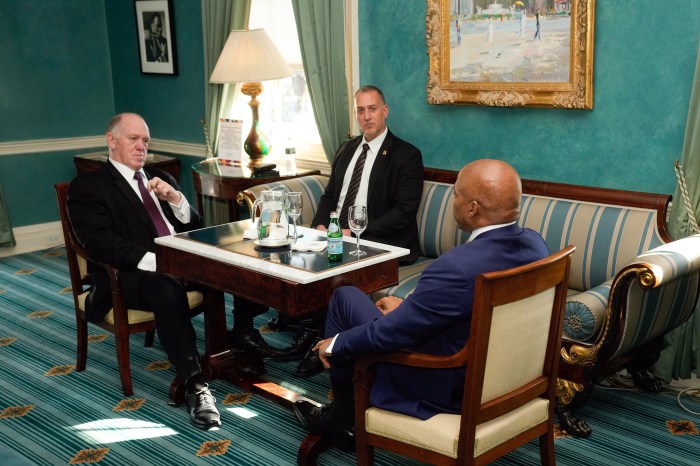BY SAM SPOKONY | Eight Occupy Wall Street protesters were convicted on Mon., June 18 of misdemeanor trespassing on property owned by Trinity Church Wall Street last December, all of whom vow to appeal the decision, according to their attorneys.
After a week-long, non-jury trial, a criminal court judge found the demonstrators guilty of entering Duarte Square, a lot on the corner of Canal and Varick Streets, without the church’s permission.
Seven of the defendants were sentenced to four days of community service. The eighth, Mark Adams, was also convicted of criminal mischief and attempted criminal possession of burglar’s tools — both misdemeanors — and sentenced to 45 days in jail, according to the Manhattan District Attorney’s office.
Paul Mills, representing Ted Alexandro and three of the other protesters who were convicted on June 18, said he believes the grounds for appeal are strong, in part because signs posted around Duarte Square at the time of the December 2011 arrests stated that the park was open to the public year-round from 7 a.m. to dusk.
“There’s a question in my mind as to whether anyone can ever be convicted of trespassing when a park has a sign up saying that it’s open to the public,” said Mills.
Photos of those signs had been submitted as evidence during the criminal court trial, according to an article that appeared in The Villager’s June 14 print edition.
Alexandro, a stand-up comedian who has been featured on Comedy Central and late-night national T.V., wouldn’t comment on the events that took place in Duarte Square the day of his arrest. He had refused a plea bargain offered by the District Attorney in March — which would have left him without a criminal record — because he felt compelled to call attention to perceived violations of O.W.S. protesters’ First Amendment rights, he said.
“This all pales in comparison to the illegality of the police evicting us from Zuccotti Park,” Alexandro elaborated. “For reasons like that, on behalf of my own rights and the rights of others, I want to see this process all the way through.”
Gideon Oliver, who represents Bishop George Packard, the retired Episcopal bishop who first climbed the fence surrounding Duarte Square on Dec.17, said an additional reason for appeal was that defense lawyers never had the chance to prepare arguments regarding their clients’ sentencing. Had they been able to present their arguments, the defense would have had the opportunity to request minimum conviction sentences, which could have decreased the amount of jail time now being served by Mark Adams, Oliver noted.
“We all expected there to be an adjournment granted before sentencing,” said the attorney. “But it just seemed like the judge [Matthew Sciarrino, Jr.] was done with the trial and didn’t want to make time for that.”
O.W.S. demonstrators were removed from their original encampment at Zuccotti Park, a few blocks away from Trinity Church, in an unannounced overnight raid by the N.Y.P.D. last November. The protesters’ Dec. 17 attempt to enter Duarte Square was part of a search for a new base of the movement’s operations.
In a statement released following the June 18 verdict, Manhattan District Attorney communications director Erin Duggan said that, although her office respects the First Amendment rights of protesters, “[These rights] must be exercised in a way that does not violate the law or infringe upon other citizens’ rights.”
Reverend John Merz, a member of the Episcopal Diocese of Long Island, was one of 65 people arrested in Duarte Square on Dec. 17. Rather than fight his trespassing charges in court, he chose to accept a plea bargain offered by the District Attorney.
But Merz said he still believed that leaders of Trinity Church were wrongly “playing both sides of the fence” regarding what he called their initial encouragement of O.W.S. and the subsequent lack of help when it came to the protesters’ search for a new encampment.
Trinity Church had previously allowed O.W.S. protesters to take refuge in Charlotte’s Place, a small gathering space the church owns on Greenwich Street between Rector and Carlisle Streets. There, protesters were offered shelter in addition to free access to computers and Internet during the time of their encampment at Zuccotti Park.
Over the course of the trial, many of those arrested on Dec. 17 said they believed the arrangement would continue into the new year.
“Trinity, which had publicly espoused its support, was simply being held to its word when we entered Duarte Square,” said Merz.
On June 18, the same day of the verdict, the church published on its blog that it is “sympathetic to many of the O.W.S. protesters’ stated goals.” But its spokesperson, Linda Hanick, said that permission to use private church property had never been granted, adding that “[our] position has been crystal clear and unequivocal from the start.”
In a statement Packard read in court after being convicted, the bishop firmly disagreed with Trinity Church, calling into question the balance between their spiritual and financial concerns.
“Is this entity a corporation worried about fiduciary interest or a portion of the Body of Christ? Which are they?” said Packard. “We have received our answer today by their insistence for [these charges]. In a time when we hope our moral institutions will speak with clarity…this one didn’t.”



































